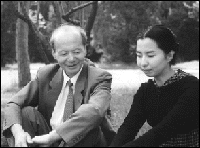|
|
|
ٹؤ“آپFƒtƒFƒŒƒ“ƒcپEƒ‚ƒ‹ƒhƒ”ƒ@ƒj
Director : Ferenc Moldov‡nyi |
1960”NپAƒnƒ“ƒKƒٹپ[‚جƒfƒuƒŒƒbƒcƒFƒ“‚ةگ¶‚ـ‚ê‚éپB82”NپAƒfƒuƒŒƒbƒcƒFƒ“ژt”ح‘هٹw‘²‹ئپB82”N‚©‚ç86”N‚ـ‚إƒpƒmƒjƒAژB‰eڈٹ‚إڈ•ٹؤ“آ‚ئ‚µ‚ؤ‹خ–±پB“¯ژ‚ةƒuƒ_ƒyƒXƒg‚جƒچƒ‰ƒ“ƒhپEƒGپ[ƒgƒ”ƒFپ[ƒX‘هٹw‚إ“Nٹw‚ًٹw‚شپB87”N‚©‚ç90”N‚ـ‚إƒuƒ_ƒyƒXƒg‰‰Œ€پE‰f‰وƒAƒJƒfƒ~پ[‚إٹw‚رپAƒpƒٹ‚جƒ‹ƒCپEƒٹƒ…ƒ~ƒGپ[ƒ‹‰f‰وٹwچZ‚إ1”N‚ً‰ك‚²‚·پB‰f‰وٹؤ“آ‚ئ‚µ‚ؤ‘²‹ئپBˆب—ˆپAگ”–{‚جƒhƒLƒ…ƒپƒ“ƒ^ƒٹپ[‚ًگ»چىپBپwInaugurationپx(87)پAپwHere and Nowپx(88)پAپwThe Godfatherپx(93)پAپwIf We Eat a Beaver...پx(94پ|95)‚ب‚اپBپwکH“¹پx‚حڈ‰‚ج’·•ز‰f‰و‚إ‚ ‚éپB Born in Debrecen in 1960. Graduated from the Debrecen Teacher Training College in 1982. From 1982 to 1986 worked as assistant director at Pann—nia Filmstudios. Meanwhile attended the Philosophy Faculty of the L—r‡nd Eڑtv—s University in Budapest. From 1987 to 1990, studied at the Budapest Academy of Drama and Film and spent one year at the Paris School Louis Lumiژre. He graduated as a film director and has made several documentaries. They include Inauguration (87), Here and Now (88), The Godfather (93), If We Eat a Beaver... (94-95). The Way is his first feature film. |
 |
|
| •¶‰»‘هٹv–½‰؛‚ج’†چ‘‚ةگآڈt‚ًچس‚©‚êپA‚»‚جŒمƒnƒ“ƒKƒٹپ[‚ةˆع–¯‚µ‚½ڈ‰کV‚ج’†چ‘گl’jگ«‚جڈI‚ي‚è‚ب‚¢پuˆ¤پv’T‚µ‚ئ–k‹‚ةژc‚³‚ꂽ‘§ژq‚جپuگ^ژہپv’T‚µ‚ًپA“ٌگl‚جƒ‚ƒmƒچپ[ƒO‚ئ‰f‘œ‚إ‚آ‚أ‚éپB’·”NƒhƒLƒ…ƒپƒ“ƒ^ƒٹپ[‚ًچى‚ء‚ؤ‚«‚½ƒnƒ“ƒKƒٹپ[گl‚جٹؤ“آ‚ھپAˆظچ‘‚إگlگ¶‚جگـ‚è•ش‚µ“_‚ًŒ}‚¦‚é’j‚جŒا“ئ‚â‹ê‰÷‚ًژہک^‚µ‚½ƒtƒBƒNƒVƒ‡ƒ“چى•iپB | An elderly Chinese man, now living in Hungary, reminisces his life of broken marriages and crushed dreams while he continues to search for ideal love. His twenty-year old son, an aspiring poet in Beijing, lives a wandering lonesome life pursuing an ideal truth. The Hungarian director uses monologues and documentary- style images to portray a strong subjective sense of reality in his first feature film. |
|
|
|
|
ٹؤ“آ‚ج‚±‚ئ‚خ Œ»ژہپA‚ ‚é‚¢‚ح’N‚©‚جژہکb‚©‚çپAگlگ¶‚ة‚¨‚¢‚ؤچإ‚àڈd—v‚بŒ`ژ§ڈم“I–â‘è‚ً”cˆ¬‚·‚邱‚ئ‚ب‚اپA–{“–‚ة‰آ”\‚ب‚ج‚¾‚낤‚©پHŒ»ژہ‚ج’¼گع“I‚بڈ–ڈq‚ھژ–•؟‚ج–{ژ؟‚ً‰B•ء‚·‚邱‚ئ‚à‚ ‚é‚ج‚إ‚حپHƒhƒLƒ…ƒپƒ“ƒ^ƒٹپ[‚ئ‚¢‚¤“`““I‚ب“¹‹ï—§‚ؤ‚إچ°‚ج”é–§‚ة“’B‚·‚邱‚ئ‚ح‰ت‚½‚µ‚ؤ‰آ”\‚ب‚ج‚©پH‚±‚ê‚ç‚حپA’·ٹْ‚ة‚ي‚½‚éڈ€”ُٹْٹش‚ًŒo‚ؤپAپwکH“¹پx‚جژB‰e‚ة“ü‚ء‚½ژ‚ةژ„‚ھ•ّ‚¢‚ؤ‚¢‚½‹^–₾‚ء‚½پB‹ï‘ج“I‚©‚آ“¯ژ‚ة“Nٹw“I‚بژ–•¨‚ً‰ًژك‚·‚é‚ج‚ة‚س‚³‚ي‚µ‚¢ژهگlŒِپA–{•¨‚جƒXƒgپ[ƒٹپ[پA‰f‰و“IŒ`ژ®‚ئ•û–@ک_‚ًŒ©‚آ‚¯‚ب‚‚ؤ‚ح‚ب‚ç‚ب‚©‚ء‚½پBژذ‰ï‹Lڈq“I‚إ’¼گع“I‚بڈ–ڈq‚ئ‚¢‚¤•پ’ت‚جƒhƒLƒ…ƒپƒ“ƒ^ƒٹپ[ژè–@‚âکb–@‚ئ‚حˆظ‚ب‚éپu“¹پv‚ًŒ©‚آ‚¯‚é•K—v‚ھ‚ ‚ء‚½‚ج‚¾‚ئژv‚¤پBŒ»ژہ‚ج’f•ذ‚ً—p‚¢‚ؤپA‚و‚èچ°‚ًگkٹ¶‚³‚¹‚éپA‚و‚è–{•¨‚جپuŒ»ژہپv‚ًچ\’z‚µ‚½‚¢‚ئژv‚ء‚½پBژهٹد“I‚بƒٹƒAƒٹƒeƒB‚ةŒ€“I‚ب—v‘f‚ئڈ–ڈîگ«‚ً—Zچ‡‚³‚¹‚邱‚ئ‚ة‚و‚ء‚ؤپA‚و‚èگ[‚¢Œ|ڈp“I‚بگ^ژہ‚ة“’B‚·‚邱‚ئ‚ھ–ع“I‚¾‚ء‚½پBژ©•ھ‚جƒRƒ“ƒZƒvƒg‚ة‚ ‚ء‚½ژهگlŒِ‚ئ•¨Œê‚ھŒ©‚آ‚©‚é‚ـ‚إپAژ„‚ح’†چ‘گl‚ج—Fگl‚½‚؟‚ةˆح‚ـ‚ê‚ؤ’·‚¢ژٹش‚ً‰ك‚²‚µ‚½پB‚±‚ج‰f‰و‚ًچى‚邱‚ئ‚حپAژ„‚ة‚ئ‚ء‚ؤ’·‚¢—·‚¾‚ء‚½پB’H‚ç‚ب‚‚ؤ‚ح‚ب‚ç‚ب‚¢پu“¹پv‚¾‚ء‚½‚ج‚¾پB |
Director's Statement Is it really possible to grasp the most important metaphysical questions of life through reality or someone's true story? Could it be that the direct depiction of reality covers up the essence of the matter, can the traditional tools of documentaries reach the secrets of the soul? Such questions came to my mind when after a long preparation-period I started to shoot my film The Way. I had to find my hero, a genuine story, the cinematographic form and method that was suitable to interpret concrete and philosophical matters. I believe that I had to find a " way, " other than the usual sociographical, direct depiction of documentarism, a narrative style. Using the fragments of reality I wanted to build a more soul-stirring, a more genuine " reality. " The aim was to fuse subjective reality with drama and lyricism to reach a deeper artistic truth. I spent a long time among my Chinese friends until I found my hero and the story that corresponded with my concept. Making this film was a long journey for me; it was " the way " I had to take. |
